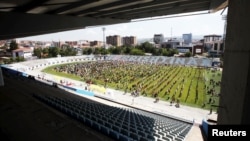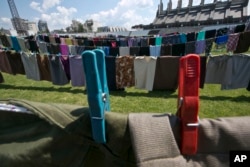The red satin dress has a message written across the rosebud pattern: "This dress has a bitter story.''
It was donated by a rape victim from Kosovo's war of independence to hang Friday along some 5,000 skirts and dresses stretched on clotheslines across a football field in Kosovo's capital Pristina.
The display is an art installation that seeks to heighten awareness of the plight of war rape victims and help many of them break the silence they kept for over 15 years since the end of Kosovo's 1998-99 war. The dresses were donated in response to a call by Alketa Xhafa-Mripa, a Kosovo-born British artist whose work often deals with sexual violence.
Thousands of women were raped during Kosovo's war with Serbia, the overwhelming majority of them ethnic Albanian. Exact figures are not recorded as the issue is often suppressed in Kosovo's patriarchal society.
Many of the dresses were donated by rape victims themselves. Some were brought by the victims' husbands, brothers and sons. The vast majority were donated by Kosovar women parting from dresses they wore on special days: weddings, birthdays or funerals.
Politician Vlora Citaku gave the dress she wore on the day Kosovo seceded from Serbia on Feb. 17, 2008. Kosovo born pop star Rita Ora also donated a dress.
"Finally the time came for them to get some recognition and some help that they deserve. What we're doing is bringing the whole society as one, where it's not them and us,'' Xhafa-Mripa told The Associated Press. "All these skirts represent us as women.''
The art installation is backed by Atifete Jahjaga, Kosovo's first woman president. Jahjaga said the one-month long campaign was "a call to break the silence, to fight the stigma a call to act, a call to awareness raising and a call for acceptance.''
"We got together to remember their pain,'' she said, "to recognize their sacrifice. And to tell them that they are not alone.''
Kosovo's ethnic Albanians fought a separatist war against Serbia at the tail-end of the 1990s Balkans wars that led to the disintegration of Yugoslavia. Serb forces launched a heavy-handed crackdown against the ethnic Albanians; the rising civilian toll led to a NATO bombing campaign against Serbia to end the atrocities. Some 10,000 people were killed. Serbia rejects Kosovo's secession.
"It is dedicated to all the women who suffer in silence and couldn't talk about this problem, said Anna Di Lellio who produced the art installation. "They should be remembered and embraced and they are being embraced by the society."





